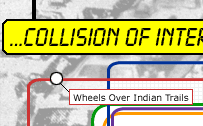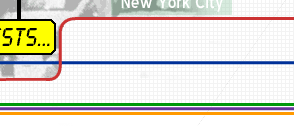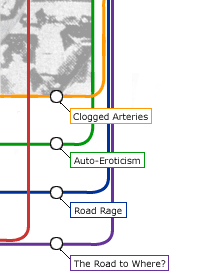



My Car || True Love is Forever || Death, Domination and Convenience
My Mother the Car
by Joaquin de la Puente
There is a fetishism towards automobiles and material objects. Object fascination and fetish are and have been a hot topic in dialectics since the emergence of industrialized consumerism.
Where Freud would tend to normalize the punishing of things outside ourselves by justifying violence towards them as an organic reaction to the horror of alienation first experienced during infancy as separateness from the mother, Marx and Cixous challenge the presumption of this "natural" perversion, recognizing that it creates normalcy of object fetish, which is the basis of capitalism (Linda Miller, 1986). Objects begin to be treated as people, to be coveted, to inspire jealousy, and to have relationships with, thus acting as surrogates to the "necessarily dysfunctional" relationship of mother and child. This surrogate relationship is seen in the fetishizing worship of cars in american society.
Cars are assumed to be neccessary, as essential to life as a human partner, and sexualized to reinforce this proxy human partner relationship.
Freud normalizes this fetish by saying that it is inevitable and possibly necessary to avoid violence toward others. This presumption transforms the Mother into an object to be acted upon. This acting upon is often expressed in the form of domination over or mastery of the threatening object -- in this case the Mother, and by proxy the automobile -- by virtue of the fact that the infant-adult wishes to have power over the life-giver (the Mother) by becoming more powerful than she, no matter if that means shaping her in his image, as he wants to see himself: stong and powerful (i.e., muscle cars and various big machines); to his tastes (as in refined engineering and the great variety of subjugating pornography); or erasing her completely (as in the sadomaschistic sexuality latent in car crashes and death as represented in J.G. Ballard's Crash and the constant violence, murder, rape, subjugation, etc, toward womyn). This proxy domination extends to all commodities pathologically.
The world is more safely viewed from within the bubble of contained, climate-controlled atmospheres that cars and high-security suburban communities offer (E. O'hara, 2001). This separation begs a more visceral spectacle for the enclosed human animal. Thus the inescapable rubber-necking and gaper's delays at accident sites can be equated to the obsession with violent culture.
It is important to recognize that it is not simply an enjoyment of watching others suffer that creates this obsession but rather a learned craving to see this violence outside of ourselves, and to entertain the fantasy of controlling the domination and violence to which we are subject, and pretending that we can turn it on and off like a television or a car. This detached sadomasochism is dangerous because flesh exists beneath the glass, plastic and steel and the stakes are life and death. Cars have no solution for humanity. Cars offer only death, domination and convenience, and cold detachment to the human heart and mind.
Back to top